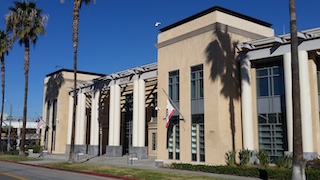California Health & Safety Code § 11370.1(a) makes it a felony to possess certain controlled substances “while armed with a loaded, operable firearm.”
Daniel Edward Gonzalez was arrested after police in Riverside County found him asleep in his parked car on the side of the road with about 0.6 grams of methamphetamine and a loaded, operable firearm.
He was later convicted of three firearm-related crimes, including a violation of Health & Safety Code § 11370.1(a), being a felon in possession of a firearm (Penal Code § 29800(a)(1)) and being a felon in possession of ammunition (Penal Code § 30305(a)). He was then sentenced to six years in state prison.
Brief Synopsis: Health & Safety Code § 11370.1 is a lawful restriction on the Second Amendment right to possess a firearm, the Fourth Appellate District ruled as there is precedent that forbidding those with drugs from possessing firearms is reasonable.
On appeal, Gonzalez argued to the Fourth Appellate District that § 11370.1 impermissibly infringes upon a nonviolent offender’s right to possess firearms as guaranteed in the U.S. Constitution’s Second Amendment, i.e., those only in possession of a firearm. To pass constitutional scrutiny, Gonzalez argues, a restriction on gun possession must be limited to “preventing violent crime.”
The Fourth Appellate District disagreed, noting from the outset that the U.S. Supreme Court, in District of Columbia v. Heller (2008) 554 U.S. 570, held that the Second Amendment does not grant “a right to keep and carry any weapon whatsoever in any manner whatsoever and for whatever purpose.” Because “there is no constitutional problem with separating guns from drugs” (United States v. Jackson (7th Cir. 2009) 555 F. 3d 635, 636), the Fourth Appellate District concluded that 11370.1 did not contravene the Second Amendment right to bear arms as interpreted in Heller.
This kind of quick analysis may be unsettling, so to understand it better, we think a deeper explanation is merited.
The starting point in any constitutional challenge to a statute, the presumption is “that it is valid” and “all doubts” are resolved in favor of its constitutionality” and a court will uphold it “unless it is in clear and unquestionable conflict with the state or federal Constitutions.” People v. Yarbrough (2008) 169 Cal. App. 4th 303, 311.
 4th Appellate District Div 2 Riverside
4th Appellate District Div 2 Riverside
The Second Amendment to the United States Constitution provides: “A well regulated Militia, being necessary to the security of a free State, the right of the people to keep and bear Arms, shall not be infringed.”
In Heller, supra, the Supreme Court decided whether a series of Washington D.C. laws banning the possession of operable firearms in the home violated the Second Amendment. In answering that question in the affirmative, the Court held the right afforded by the Second Amendment is not limited to the context of military service. Rather, the Court identified the “core” of the Second Amendment as protecting "the right of law-abiding, responsible citizens to use arms in defense of hearth and home.” Heller, supra, at 634-635.
But in striking down D.C.’s in-home ban, the Court emphasized that “the Second Amendment is not unlimited” and does not grant “a right to keep and carry any weapon whatsoever in any manner whatsoever and for whatever purpose.” Heller, supra, at 626.
It went on to state, “Nothing in our opinion should be taken to cast doubt on longstanding prohibitions on the possession of firearms by felons and the mentally ill, or laws forbidding the carrying of firearms in sensitive places such as schools and government buildings.” Id., at 626. The Court described those types of prohibitions as “presumptively lawful regulatory measures” and said the list was intended to be exemplary, not exhaustive. Id., at 627, fn 26.
After Heller, federal courts developed a two-step test for assessing Second Amendment challenges. First, the court asks “whether the challenged law burdens conduct that falls within the scope of the Second Amendment guarantee” of protecting the right of responsible, law-abiding citizens to possess firearms to protect their home. Gould v. Magana (1st Cir., 2018) 907 F. 3d 659, 668-669.
If the law does not burden protected conduct, then it does not implicate the Second Amendment and the inquiry ends. If, however, the law does infringe a law-abiding citizen’s right to possess firearms to protect their home, then the court must inquire into “the strength of the government’s justification for the law” by balancing – under the appropriate level of scrutiny – the statute’s objective against the means it employs to accomplish those ends. Ezell v. City of Chicago (7th Cir., 2011) 651 F. 3d 684, 703.
Here, the Fourth Appellate District Court found Gonzalez’ constitutional challenge does not get past the first step into means-end scrutiny. Based on the provision’s legislative history, California courts have concluded the purpose of 11370.1 is “to protect the public and law enforcement officers and stop the growing menace from a very deadly combination – illegal drugs and firearms.” In re Ogea (2004) 121 Cal. App. 4th 974, 984.
So therefore, the statute was considered valid and Gonzalez’ challenged was denied.
The citation for the Fourth Appellate District Court ruling discussed above is People v. Daniel Edward Gonzalez (4th App. Dist., 2021) 75 Cal. App. 5th 907, 291 Cal. Rptr. 3d 127.
For more information about statute constitutionality issues, please click on the following articles:
 4th Appellate District Div 2 Riverside
4th Appellate District Div 2 Riverside